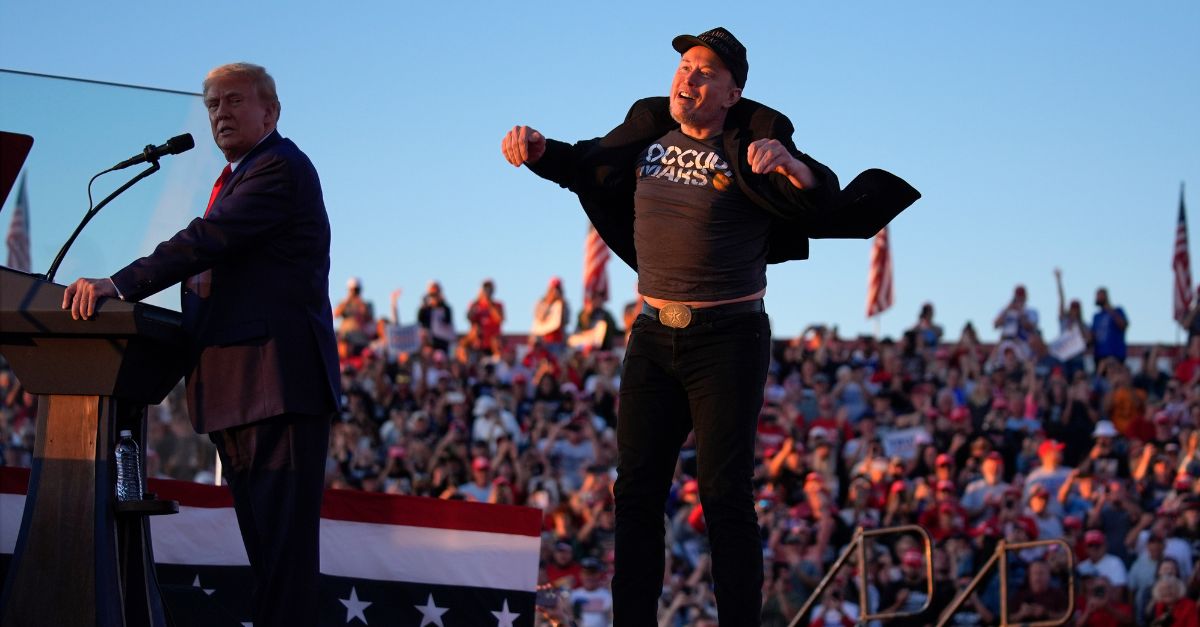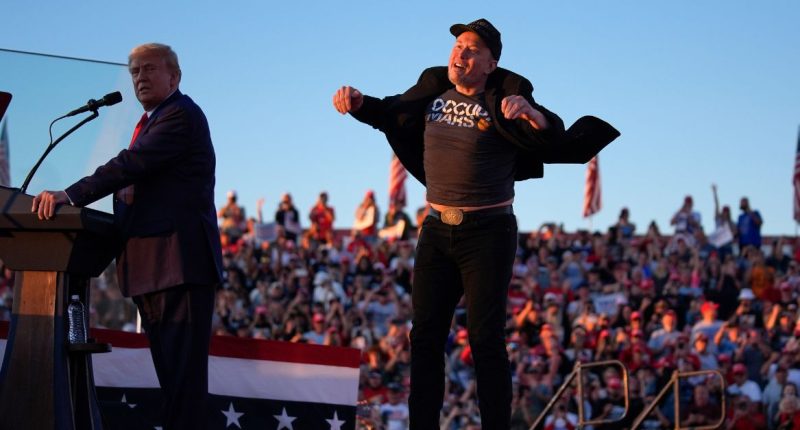
Elon Musk jumps on the stage as Republican presidential nominee former President Donald Trump speaks at a campaign rally at the Butler Farm Show, Saturday, Oct. 5, 2024, in Butler, Pa. (AP Photo/Evan Vucci)
A federal judge in the nation’s capital has ordered the Elon Musk-led Department of Governmental Efficiency (DOGE) to hand over documents requested by a government watchdog group under the Freedom of Information Act (FOIA) — which the Trump administration argued did not apply to the quasi-governmental agency.
In a 37-page ruling handed down Monday in the case of government watchdog group Citizens for Responsibility and Ethics in Washington (CREW), U.S. District Judge Christopher Cooper found that DOGE — referred to in the ruling as the U.S. DOGE Service, or USDC — was “operating with unusual secrecy,” and that, without an order to receive the requested documents, plaintiffs would likely suffer serious harm.
At a hearing on Friday, CREW’s attorneys argued that members of Congress lacked sufficient information on DOGE, its organizational structure, funding, and the agency’s authority before they could vote on funding the government on March 14.
The judge, for the most part, agreed with CREW.
“Finding that USDS is likely covered by FOIA and that the public would be irreparably harmed by an indefinite delay in unearthing the records CREW seeks, the Court will order USDS to process CREW’s request on an expedited timetable and, after receiving proposals on a production schedule, to begin producing documents on a rolling basis as soon as practicable,” the judge wrote in his order.
Cooper noted that since Trump took office, DOGE’s actions “have proceeded remarkably swiftly.”
According to the judge:
In the less than two months since President Trump’s inauguration, USDS has reportedly caused 3% of the federal civilian workforce to resign, shuttered an entire agency, cut billions of dollars from the federal budget, canceled hundreds of government contracts, terminated thousands of federal employees, and obtained access to vast troves of sensitive personal and financial data. USDS appears able to do this in part because of its access to many agency’s IT systems, which help the department carry out its objectives at warp speed. But the rapid pace of USDS’s actions, in turn, requires the quick release of information about its structure and activities. That is especially so given the secrecy with which USDS has operated.
That “secrecy,” according to Cooper, included keeping the name “USDS Administrator” Amy Gleason out of the public eye until late February and not releasing public information about other DOGE personnel.
“[T]he authority exercised by USDS across the federal government and the dramatic cuts it has apparently made with no congressional input appear to be unprecedented,” the judge wrote. “All these factors together bolster the Court’s conclusion that a yearslong delay in processing the USDS Request would cause irreparable harm.
Cooper also detailed his reasoning for finding why DOGE would be subject to FOIA, despite the Trump administration’s claims that DOGE wasn’t an independent agency, but rather a part of the executive branch. Citing examples such as an executive order giving DOGE “the authority to implement the DOGE Agenda, [and] not just to advise the President in doing so,” as well as concluding that DOGE was behind the effort to close USAID and carry out “mass firings” across government agencies, the judge found that, “on this preliminary record, CREW will likely succeed in demonstrating that USDS wields the requisite substantial independent authority” such that it would qualify for FOIA.
From the judge (citations omitted):
USDS also claimed to have eliminated 104 DEI-related contracts with the federal government, saving $1 billion, and saving another $900 million through the termination of 89 of the Department of Education’s contracts. Canceling any government contract would seem to require substantial authority — and canceling them on this scale certainly does. Again, USDS reportedly is leading the charge on these actions, not merely advising others to carry them out. From these reports, the Court can conclude that USDS likely has at least some independent authority to identify and terminate federal employees, federal programs, and federal contracts. Doing any of those three things would appear to require substantial independent authority; to do all three surely does.
Cooper didn’t give CREW everything it wanted — specifically, the judge did not order that the documents be provided by Monday, as CREW had requested.
“CREW has not established that it is entitled to disclosure by a date certain, however,” the judge wrote. “The Court will therefore deny CREW’s request for an order directing OMG and USDS to produce records by today.”
Cooper also ordered the agencies to “preserve all records that may be responsive to CREW’s FOIA requests.”
CREW filed the lawsuit against DOGE in February, accusing the pseudo-agency of unlawfully refusing to comply with its FOIA requests for records associated with the government group’s actions and ignoring repeated demands for DOGE to preserve its records under the Federal Records Act.
CREW requested expedited records and documents related to communications between Office of Management and Budget (OMB) staffers and individuals who were affiliated with DOGE prior to Trump’s inauguration, changes to the operations of the U.S. Digital Service, organizational charts and financial disclosures, and DOGE’s communications with federal agencies, which DOGE and the other plaintiffs have so far failed to turn over.
The Trump administration responded to the litigation by claiming that DOGE was not subject to FOIA laws due to the president’s designation of the entity as a “free-standing component of the Executive Office of the President.”
FOIA allows the public to obtain nonexempt information from executive branch agencies and departments that do not function “solely to advise and assist the President.”
“We’re grateful for Judge Cooper’s decision,” CREW said in a statement posted to its website on Monday. “Now more than ever, Americans deserve transparency in their government. Despite efforts and claims to the contrary, the government cannot hide the actions of the US DOGE Service. We look forward to the expedited processing of our requests and making all the DOGE documents public.”
Love true crime? Sign up for our newsletter, The Law&Crime Docket, to get the latest real-life crime stories delivered right to your inbox.






